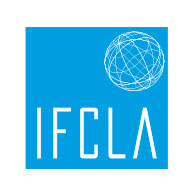Histoire de l'IFCLA
par Dinant T.L. Oosterbaan
IFCLA President 2004-2006
contenu disponible uniquement en anglais
IFCLA, the International Federation of Computer Law Associations, was founded in December 1986 in a meeting in Brussels attended by representatives of the Belgian, French and Dutch Computer Law Associations: Yves Poullet, Philippe Peters, André Bertrand and Dinant Oosterbaan. Bradley Brown, the chairman of the UK Society for Computers and Law was unable to attend but he indicated that the Society was very interested in building relationships with similar organisations.
IFCLA was the logically international extension of other computer law initiatives.
The year 1987 was used to enlarge the IFCLA membership.
The Amsterdam 1988 conference was a joint effort of many people, in particular Dan Cooper, Ian Kyer, Guy Vandenberghe and myself.
In June 1989 the French Computer Law Association AFDI hosted the first 'working day' of IFCLA.
The 1990 conference entitled 'Information Technology: Trading with Europe – West and East' took place in Munich and was hosted by DGRI.
The 1992 conference was another highlight.
For the first time a book of conference papers was published in the Nordic Law and Informatics series.
In 1994 the Society for Computers and Law hosted the IFCLA conference in the world heritage city of Bath, England.
In 1995 IFCLA was faced with a small crisis.
Benoît Strowel, vice-president of the Belgian Association for Computers and Law, accepted the challenge of organizing the 1996 conference in Brussels entitled 'Multimedia and the Internet: Global Challenges for Law' on short notice which he did extremely well.
In 1998 the IFCLA conference moved to Norway to the Holmenkollen Park Hotel just outside of Oslo.
The 2000 Paris conference 'Computer Law in the Millennium Perspective' was another very successful IFCLA conference, held in the prestigious surroundings of the Paris Chamber of Commerce.
'New Views on Global IT' was the subject of the 2002 conference, hosted by the German Computer Law Society DGRI.
The 2004 IFCLA conference moved for the second time to England.
The 2006 IFCLA conference was held in Amsterdam.
The French Society, AFDIT, took over IFCLA for 2006-2008, with Andre Meillassoux, as President.
The IFCLA 2010 Conference in Helsinki, Finland differed from other technology law conferences by making it possible to follow a single track under the main theme 'Convergence' throughout the whole two-day event.
Munich was the venue of the IFCLA 2012 Conference.
Dinant T.L. Oosterbaan, IFCLA President 2004 – 2006
André Meillasoux, IFCLA President 2006 – 2008
Arto Linnervuo, IFCLA President 2008 – 2010
Wolfgang Buechner, IFCLA President 2010 – 2012
Steven De Schrijver, IFCLA President 2012 – 2014
Roger Bickerstaff, IFCLA President 2014 - 2016
Marie-Hélène Tonnellier, IFCLA President 2016 - 2018
Anna Haapanen, IFCLA President 2018 - 2020




